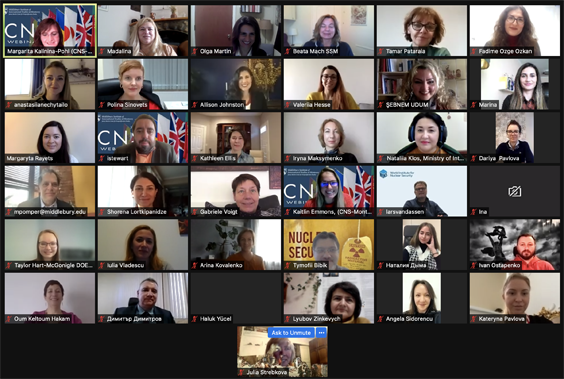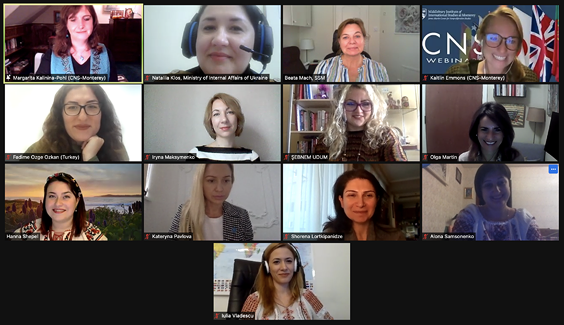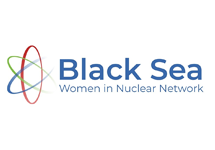January 21, 2022
Margarita Kalinina-Pohl, Nomsa Ndongwe, and Kaitlin Emmons
The James Martin Center for Nonproliferation Studies (CNS) concluded 2021 with the successful launch of The Black Sea Women in Nuclear Network. This project was a joint effort between CNS and the Los Alamos National Laboratory that culminated in the establishment of a professional network for women working in nuclear fields in the Black Sea region.
The idea for this network originated during the conference on “Promoting Nuclear Security Education and Creating Gender Awareness in Ukraine” held in Ukraine in 2019. Ukrainian experts and international counterparts discussed ways to increase awareness of gender equity and how to encourage young women in Ukraine to join the nuclear sector. The formation of a professional network that would promote and support women working in nuclear fields was one of the recommendations made at the conference. CNS further nurtured this idea by developing this into a Black Sea regional initiative which then received support from the U.S. Department of Energy National Nuclear Security Administration (US DOE NNSA) and the Swedish Radiation Safety Authority.
The formation of The Black Sea Women in Nuclear Network took place during a virtual workshop that was hosted by CNS, in partnership with the Odessa Center for Nonproliferation and WiN (Women in Nuclear) Ukraine, from November 29 to December 3, 2021. The aim of the workshop was to inaugurate the network, amplify voices of women in nuclear fields, highlight the existing abundance of regional knowledge and experience, share views on gender related issues, and to explore mentorship, training, and networking opportunities for women from the Black Sea region working in nuclear fields.

Over 50 participants, mostly women and some men, from Bulgaria, Georgia, Moldova, Romania, Turkey, Ukraine, and other countries, convened for this virtual gathering. The audience was diverse in age, fields, and experience. Participants ranged from the youngest and the only female commercial reactor operator in Ukraine to an expert from Romania with over three decades of experience, both working at nuclear power plants in their respective countries. Other participants included experts from think tanks, universities, national nuclear regulatory authorities, and other governmental bodies with responsibilities for nuclear security.
Workshop sessions and panel discussions were led by over 40 speakers from 35 different organizations, laboratories, agencies, and universities from the region and around the world. Dr. Elena Buglova from the International Atomic Energy Agency (IAEA) and Ms. Allison Johnston from the U.S. DOE NNSA opened the workshop.
Dr. Buglova, director of the IAEA Division on Nuclear Security, commented that while this workshop addressed a regional audience, it made a global statement about the important roles that women can play and should play in the nuclear field. She also referred to the most recent IAEA’s Women in Nuclear Security Initiative calling it one of the most important developments of 2021 to promote gender parity and equality in the nuclear sphere. “Our voice for more women in this field is now loud and heard everywhere,” Dr. Buglova said.
Ms. Allison Johnston, director of the NNSA’s Office of International Nuclear Security, made a reference to the NNSA’s Nuclear Security Women Initiative as a tool to increase the opportunities and visibility of women currently in this field and to engage young women early. “The lack of women in this field is an issue we are committed to addressing head on,” Ms. Johnston remarked.
Notably, the workshop’s program was plentiful with former CNS visiting fellows from Bulgaria, Georgia, Malaysia, Serbia, Ukraine, and Turkey, who spoke at various sessions throughout the workshop. Former CNS visiting fellows presenters included Dr. Dimitar Dimitrov (VF’15), Dr. Tamara Pataraia (VF’99), Ms. Sabariah Kader Ibrahim (VF’19), Ms. Marina Dabetic (VF’19), Dr. Polina Sinovets (VF’06), Ms. Nataliia Klos (VF’10), Dr. Tymofii Bibik (VF’21), Ms. Hanna Shepel (VF’20), Ms. Anastasiia Nechytailo (VF’20), and Ms. Fadime Ozge Ozkan (VF’20).
Workshop Highlights
Workshop’s session topics addressed regional challenges to nuclear security and nonproliferation, international cooperation and assistance in the Black Sea region, international efforts promoting women, and women’s roles and representation in the Black Sea’s nuclear sector, among others.
A special session was devoted to presentations by the presidents from country chapters of WiN, that featured Ukraine (Ms. Margaryta Rayets), Turkey (Dr. Bahire Gül Göktepe), Tajikistan (Dr. Nodira Khakimova), and former WiN Global president Dr. Gabrielle Voigt.
In line with the workshop’s focus of bringing women professionals together to create a network, participants had the unique opportunity to engage with speakers in a meaningful, and more personal capacity. During this panel session, female professionals who are all at various stages of their careers, spoke about their experiences as women working in nuclear fields. Speakers shared observations about gender equality specific to their workplaces and in their home countries in general.
Ms. Dariya Papezhuk from Ukraine shared her experience of entering this profession that was off limits to women in her country until recently. As a first female reactor operator at the Ukraine’s Rivne NPP, Dariya faced certain challenges in a traditionally male working environment. One of them was a lack of a uniform of her size, which is illustrative of what Ms. Rhonda Evans from the World Institute for Nuclear Security (WINS) often points out – the need to create women-friendly environments and conditions which would attract more women to nuclear fields. Dariya concluded that despite the hurdles she experienced in the beginning, she successfully overcame challenges and hoped that her story would inspire other women to join the ranks of her profession.
Ms. Mădălina Ștefanic from Romania’s Chernovoda NPP spoke about women roles and representation at her company observing that 24% of their workforce are women.
As the first recipient of the IAEA Marie Sklodowska-Curie Fellowship from Eastern Europe, Ms. Marina Dabetic from the University of Belgrade, expressed her gratitude to the IAEA for recognizing importance of women in science and explained how this fellowship will boost her career as a nuclear researcher.
Ms. Fadime Özge Özkan, a PhD student at Energy Institute of Istanbul Technical University, noted that the culture within the family plays a role in determining the career of a woman. Even with a large representation of women researchers and instructors at Energy Institute of Istanbul Technical University (over 60%), Ozge believes that there is a need for a greater representation of women in her organization’s leadership. “If women lead, they can change the culture of the organization,” Ms. Özkan indicated.
Ms. Angela Sidorencu, from Moldova’s General Police Inspectorate, commented that while her government has made commitments towards gender balance at work, “unfortunately there are professional attitudes that limit women’s choices.”
Dr. Shorena Lortkipanidze from the Georgia’s Civil Council on Defense and Security discussed how her organization is trying to enshrine gender equality values within the workplace. Dr. Lortkipanidze explained that women in civil society are making tremendous contributions to Georgia’s gender equality laws, but they are not holding a lot of decision-making positions in the civil society sector. Consequently, her focus is on providing opportunities for young women from diverse backgrounds. “When creating alternatives to governing power structure, we need to question whether we are following the old male paths” Dr. Lortkipanidze observed.
Other program highlights included two discussion panels, one by male colleagues on the topic “How Can Men Be Allies with Women in Nuclear Fields” and another panel featuring prominent women experts who discussed their career paths, challenges, and opportunities. The idea to add a panel featuring male experts was based on recommendations from prior regional events to include more men in gender-related discussions.
Dr. Jason Harris (USA) opened the discussion with his presentation on how he sees the gender equity from his male vantage point and provided some practical recommendations on how to achieve gender equity and become women advocates and allies.
Dr. Tymofii Bibik (Ukraine) applauded the change in Ukrainian legislation in recent years that now allows women to work as reactor operators and handle radioactive sources. Building on this change in legislation, he suggested the next step towards gender parity should be a change in thinking among academics. “I wish to make a recommendation, to involve men in these types of workshops and meetings to change their opinions.” Dr. Bibik suggested.
Dr. Dimitar Dimitrov (Bulgaria) noted that from his perspective as a rector of an academic institution, he always tries to keep equity between different genders. He emphasized the importance of the role of the senior leadership in promoting gender equity.
Dr. Haluk Yücel (Turkey) shared how he works to promote gender inclusivity in his capacity as an academic and supervisor of university students, by encouraging students to become scholars. Dr. Yücel concluded his remarks by voicing his strong support for women and women with different abilities. “I believe that women should gain their rightful place in the nuclear field. I especially encourage young female students to pursue master’s degrees and PhD degrees in nuclear fields. We must make continuous efforts to turn gender parity in the nuclear field in favor of women and support new gender equity activities, especially in low-income countries in the world,” Dr. Yücel stated.
Mr. Lars van Dassen (WINS) highlighted some current thoughts with regards to gender parity in the workplace and equality more broadly. He discussed the struggle between an institutional approach to gender parity in comparison to an individualistic approach and noted that the two are compatible. He also underlined the importance of promoting diversity based on effective legislation. Mr. van Dassen then addressed the issue of organizational culture, both internal and external, as well as the challenges of bridging different perspectives on the topic of gender equality. He concluded by advocating for open-mindedness and dialogue.
The second panel of prominent female experts with illustrious careers in the field of nuclear security and nonproliferation featured Ms. Teona Akubardia (Georgia), Ms. Kateryna Pavlova (Ukraine), Ms. Elena Sokova (Vienna Center for Disarmament and Non-Proliferation), Dr. Sebnem Udum (Turkey), and Ms. Jennie Gromoll (USA). Representing their respective governments, academia, and nongovernmental organizations, these remarkable women shared stories of their career paths, hurdles encountered, and opportunities presented along the way. This panel was promoted on social media to capture many of the statements made during this panel. While each speaker had a unique story to tell, all advocated for the importance of women supporting and helping each other through networking, mentorship, and other activities aimed at empowering women.
The importance of mentorship was brought up by various regional and international stakeholders throughout the workshop. Ms. Sarah Bidgood, CNS Eurasia Program Director, shared her experience of running a mentorship program for your women under the auspices of the Young Women in Nonproliferation Initiative which she launched in 2018.
The workshop agenda also included presentations by two former CNS visiting fellows, Ms. Nataliia Klos (Ukraine) and Ms. Sabariah Kader Ibrahim (Malaysia) who spoke about their work in promoting women in nuclear fields in their home countries and regions. Ms. Klos presented her recent project on the professional development of women and the leadership policy on gender parity in Ukraine’s nuclear sector. Ms. Kader Ibrahim shared her experience of establishing a professional network for women in nuclear in Southeast Asia. Both presentations were important testaments of the work CNS former visiting fellows do to promote and empower women in their home countries and regions.
The structure of the workshop allowed attendees several opportunities to share ideas, connect with fellow experts in the region, and establish professional and personal relationships. Informal and intimate discussions revealed common struggles shared by women in the field and created powerful bonds that translate across linguistic barriers, unlikely partnerships and collaborations, and geographic distance.

The Network
Ultimately, this workshop successfully established the foundation for a professional network for women in nuclear fields, including nuclear security, safety, and nonproliferation in the Black Sea region. The workshop actively engaged several international allies that will help ensure a sustainable regional partnership.
The Black Sea Women in Nuclear Network’s mission is to connect, support, and empower women in nuclear fields. Interdisciplinary by nature, the network will bring together women in STEM and policy from national governments, industry, civil society, and academia from Bulgaria, Georgia, Romania, Turkey, Ukraine, Moldova, and other countries. The network will serve as a platform for professionals to promote gender equity and increase women’s leadership roles, as well as offer professional exchanges, mentoring, and training opportunities.
The Black Sea Women in Nuclear Network will include three working groups responsible for the outreach, mentorship, and other network activities. Ms. Nataliia Klos from Ukraine will serve as the Network’s coordinator. Find more information about the network and its inaugural workshop.

